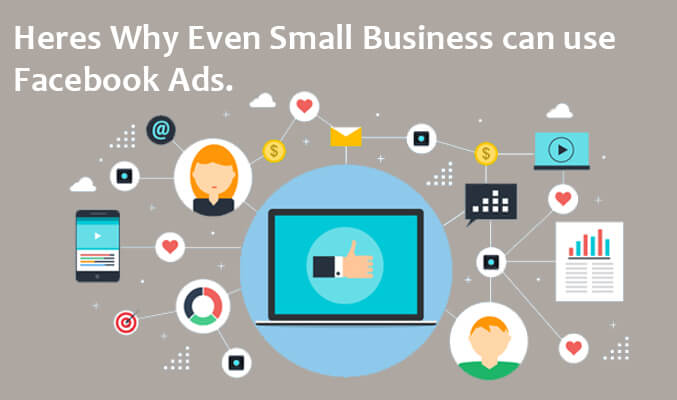How Facebook marketing helps your business
According to Facebook’s official report, there are over 90 million small businesses there. Knowing this makes Facebook one of the most important marketing channels for small businesses. That’s because it’s a quick and efficient way to reach out to prospects and share your business updates with local customers. Both new and old customers will learn about what you are offering them as well as how they can benefit from using your services or products.
The only problem is that going this route may be difficult if you don’t know where to start. But don’t fear. We are going to share the best Facebook Marketing Tips for Small Businesses that you can implement today in order to get the ball rolling today.
Create a business page
If you want to have a solid and professional Facebook presence, you need to create a separate page for your business – your personal Facebook profile won’t cut it. A page is like a regular profile, but it’s for brands and business. Also, instead of asking to “friend” someone, users must “like” or follow a page to see its posts.
- Sign up. You will need to either use your personal Facebook page, or you can create a page from scratch. Visit https://www.facebook.com/pages/create, and select the type of page you wish to create. Fill in the page name, category and description; then click Create Page.
- Add photos. It’s important to add a profile and cover photos that reflect what your business does. Given that these pictures will be providing your clients with your first impression, use high-quality images that portray your business in a positive light. Select the images and hit Save.
- Create a username. Also known as a vanity URL, your username is how your customers will find you on Facebook. Your username should be the same or as close to the name of your business as possible to avoid confusion. Once you’ve completed step two, you’ll see “create @username” under your page name. Click here to create and save your page name.
- Enter your information. When you set up your Facebook page, you’ll notice there are a lot of options to customize it. Add as much information about your business as possible, including your business name, address, contact information, website, business hours, products, etc. You will also need to create a description of what your business entails. You can add additional categories to ensure your company is included in all relevant searches on the site. As you add information, use strategic keywords throughout that indicate to both readers and to Facebook what your page is about.
- Tell your story. Although you have already entered information about your business, you will find that you can expound on the story behind your company or brand. In this section, talk about why and how your business was created, what makes your brand unique, the services and products you offer, and anything else you think will be relevant to a customer.
- Create your first post. Before you can invite people to like your page, add some content to it. Your very first post can be a simple “Welcome to our page!” Or you can post a deal or coupon, a picture, video, link, or whatever you think would be a good introduction to your brand.
- Publish and then invite followers. Once you have filled in all the details, it’s time to expand your audience! Invite people to like your page once all the information is completed.

Build brand awareness and trust
Whether you own a bakery, a law firm, or a construction company, you have to spread the word out about your business to get customers and grow your base. Since so many people are already on social media, why not reach potential customers there? When someone finds out about your business while scrolling Facebook, they’ll have the chance to click through to your website and learn more about your company, how you help others, and why they should consider working with you.
Even if someone visits your Facebook Business Page and isn’t ready to make a buying decision, they can still find value in the awareness and consideration content you share. This can include blogs on your website, links to third-party industry sites, landing pages with gated PDFs, and more.
All of these pieces will encourage people to get to know your business better and trust you as a knowledgeable, helpful resource that’s not always pushing a sale. And when they are ready to buy, they might be more likely to turn to a company they’ve come to know and trust: yours!
Try a lookalike audience in paid ads
Easily one of the top tips is the lookalike audience and it’s is one of Facebook advertising’s best features. It’s an easy way to find people that are more likely to be interested in your products and services without having them opt into Facebook ads.
Getting started with Facebook ad targetings can be tricky to master. You might confuse lookalike audiences with standard, broad targeting, but they are quite different in their approach to ad creation.
With regular targeting, you choose a few users who will represent your target audience or cold audience. By selecting just a few people from your current customer base, you find out about the most engaged customers you have and what made them come back for more once they purchase from you.
By running ads using that information as parameters, you build up trust and familiarity with potential clients who visited your site and also gave personal information such as phone numbers and emails (if they did).

Post regularly on your Facebook page
To use Facebook to promote your business, you need to do more than set up a Facebook page – you need to use it and post regularly.
“Post as frequently as you can … at a minimum, once per day,” said Katie Campbell, social media manager at Fundera. “Your audience and customers want to feel like they know your business and can relate to you.”
While it’s important to post regularly, it’s just as important to post quality content. Campbell suggests posts that share behind-the-scenes information and photos about your employees and that shows off your products or services. This shows your dedication to transparency and quality.
If you’re unsure what your customers want to see, experiment. You can use Facebook’s poll features to ask what they want to see, or take a look at Facebook Page Insights, which helps take the guesswork out of sharing.
Facebook Insights is free for every business page and shows valuable information, such as how many people engage with each post and how many people it reaches.
If you’re concerned that posting on Facebook will take up too much of your time, consider using Facebook’s publishing tools to schedule posts in advance. This can help you streamline the posting process – it also ensures that posting doesn’t slip your mind.

Connect with your followers
Setting up Facebook for your small business will give you the chance to communicate one-on-one with customers and share helpful information with them. Along with providing content for them, they can share more about themselves with you. Inviting their interactions, comments, and feedback will allow you to learn who they are and what they’re looking for in a business, product, or service.
Plus, making an effort to connect with your followers will give your company a more human side and make your page feel more like a community. This is what many of today’s shoppers look for in a company; they don’t just want to hear about helpful products and services. They’d also like to see what core values your business operates on, what community nonprofits you support, and what your company culture is like. When you share those things on your Facebook Business Page (in a professional and appropriate manner), those with similar values, passions, or mindsets will be more inclined to connect with you (or even become your customers).
Final thoughts
Facebook is the most popular social network in the world. According to statistics, there are more than 2.89 billion users on Facebook, and they spend a lot of time on the platform. Businesses can’t ignore such a huge potential audience, and many small business owners continue to use the platform for their marketing strategy for a good reason: it works!
Since Facebook targets people based on their interests, advertisers pay less for each click, and acquiring a new customer via Facebook is relatively inexpensive. As a result, Facebook marketing is very appealing to small businesses that don’t have big budgets. It makes sense since advertisers know how to allocate their advertising budget properly and Facebook helps them target their potential customers effectively and in a very targeted way.
Deciding what and when to post on Facebook should be part of an overall strategy that complements your other marketing, sales, and public relations activities. Organize these materials in a content calendar, which you or your staff can use to plan and track content that’s published on Facebook and other marketing platforms and channels. Use this content calendar to make sure that important holidays are recognized, sales are announced, company announcements are shared to your Facebook page, and much more.
